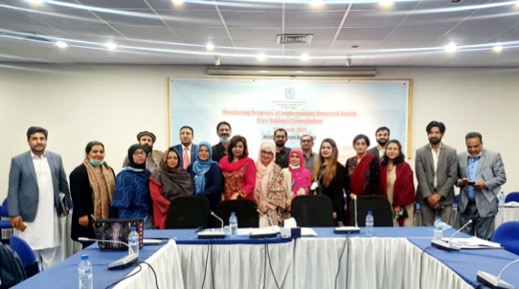A national Monitoring and Evaluation (M&E) framework for UHC implementation in Pakistan has been developed in partnership with the MNHSR&C, Health Services Academy, DCP3 Secretariat, University of Manitoba, and WHO HQ. The framework streamlines and complements existing monitoring mechanisms in the country and is aligned with the priorities defined in the Pakistan UHC investment case. It aims to measure the reduction in health system bottlenecks, track progress towards achieving the impact targets, and assess coverage.
In order to develop a comprehensive M&E package for Pakistan, a draft list of indicators was presented during an expert consultation hosted by Health Services Academy in March 2021. The expert group deliberated on the sufficiency, completeness and relativity of indicators. Challenges in measuring UHC Index at national and provincial levels and possible sources and frequency of data collection were also discussed. Particular attention has been given to the need to set specific targets to measure quality of care and equitable access, and reduction in health system bottlenecks.
The M&E indicators were selected from the UHC investment case, as well as the monitoring needs included in the Islamabad Capital Territory document for implementation of UHC at district levels. The national M&E guidance document is being used to develop the M&E framework for UHC basic package implementation in Islamabad Capital Territory region The national M&E guidance document is being used to design monitoring frameworks for UHC basic package implementation at district levels, especially in the 12 priority districts selected for the early roll-out of the Essential Package of Health Services (EPHS).
Read the full M&E report here.




